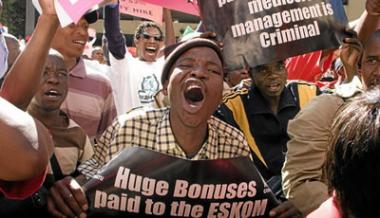Eskom's desperate tariff increases may cripple SA's Commercial Property Sector
 The "greedy" proposed annual electricity price increases could spark a repeat of protests such as those against e-tolling.
The "greedy" proposed annual electricity price increases could spark a repeat of protests such as those against e-tolling.
Eskom is desperately seeking for a total 16% a year tariff hike over the next five years which may cripple South Africa’s commercial property sector already facing increased operating costs.
The State-owned supplier of South Africa’s power, Eskom has applied for a 16% annual electricity tariff increase for the next five years. If approved, the new tariffs come into effect next year and cover the period between April 2014 and March 2018.
Business organisations, the City of Cape Town, trade unions and a host of civil society organisations on Tuesday attended Nersa’s hearings on Eskom’s tariff application, to oppose its request for an average annual increase of 16% over five years.
During the first day of public hearings, businesses and civil society asked Nersa to scrutinise Eskom’s desired R47 billion equity returns. The outcry was that these returns, as well as the projected depreciation costs, were radically escalating the firm’s revenue requirement and thus the amount by which tariffs should be increased.
Eskom’s application is based on a revenue requirement of R1.09 trillion over a period of five years. The company projected a return on assets of R187 billion, most of which would go to cover its R140bn finance costs. After paying the finance costs, R47bn of equity returns would be realised.
The company projected depreciation costs would increase an average 10 percent a year, making up R185bn of the revenue requirement. It further emerged yesterday that Eskom would require electricity tariffs to be increased by 20 percent if it was to build further power stations after Kusile.
Another cause for concern was the provision Eskom had made for the return on investment, which the hearings were told was too high
In a presentation to Nersa's public hearings, Cape Chamber of Commerce and Industry representatives Viola Manuel and Peter Haylett said the provision of energy should not be profit-driven. "It is fundamentally wrong for Eskom to generate profits. The government as the sole shareholder should be content with its VAT income from electricity sales," they said.
Eskom's proposed tariff increases are unaffordable and will have a devastating effect on the economy, the National Energy Regulator of SA heard.
Chief economist at Investment Solutions Chris Hart has warned that the proposed electricity tariff hikes could damage SA's image for investing and have negative impact on job creation.
The "greedy" proposal to double the price of electricity could cripple businesses, lead to job losses and the closure of many small businesses, and cut off electricity for poor households.
South Africa's commercial property sector is already facing increased operating costs owing to spiralling electricity costs, municipal rates and other service charges, which are outstripping income growth and pushing cost ratios to unattractive levels.
Eskom has admitted this much in one of its documents, that such an increase poses a threat to jobs in energy-intensive sectors such as mining and manufacturing. But it defended its application for the above-inflation price hikes, saying it needed to be in a position to finance its power expansion programme.
Dennis Britz, an energy specialist at steel producer Arcelor Mittal SA, said the company was already feeling the pinch from high electricity prices. Arcelor Mittal SA employs 10000 permanent workers and 8000 contract workers and is one of Eskom's top 10 customers.
"We believe the current price of electricity has already passed the tipping point of being sustainable," said Britz.
Independent Democrats-Democratic Alliance (DA) MP Lance Greyling said the return on equity and depreciation costs reportedly comprised 34% of the "unreasonable" tariff increase applied for and should be "thoroughly interrogated".
He said he believed that Eskom should be depreciating only newly built assets and not the assets for which capital expenditure had already been paid off.
"The fact is that Eskom will never have to replace its entire fleet all at once, therefore it should not be entitled to claim depreciation on the replacement value of the entire fleet," Mr Greyling told the hearing.
The DA was adamant that 7.8% was far too generous a return, especially since JSE-listed companies had on average achieved returns of only 5.5% over the past decade. "Given that the only shareholder in this case is the South African government, this could in some ways be viewed as a double taxation on electricity consumers," Mr Greyling said.


















